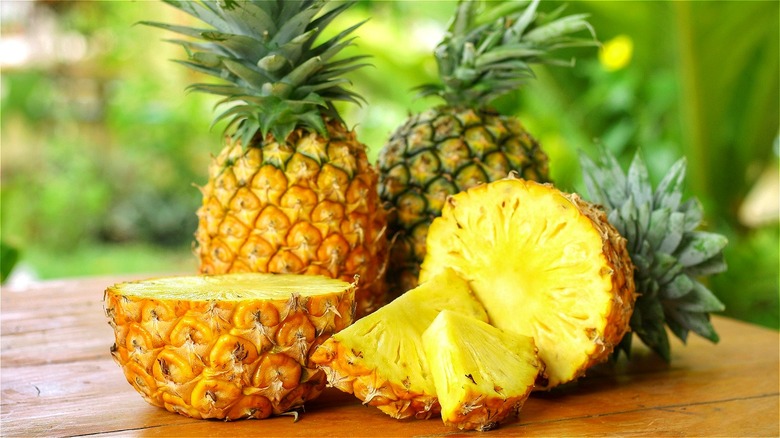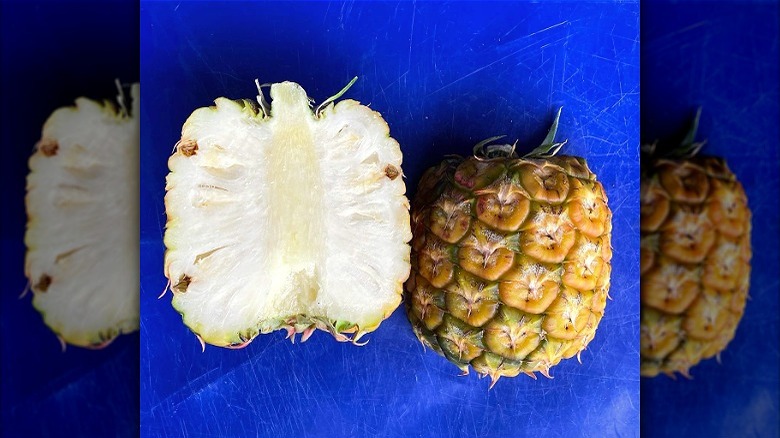The Hawaiian Pineapple Variety That Won't Irritate Your Tongue
Fruit is an easy food to like: the bright colors and unique flavors of a sense-appeasing fruit salad are often unmatched. Even though the CDC claimed in 2019, only 12% of U.S. residents met their daily fruit intake, Americans continue to enjoy fruit as part of their daily diets. According to Statista, the average U.S. citizen consumed roughly 279 pounds of fruit in 2021. Besides bananas, strawberries, and grapes ranking as the most popular fruits in The Packer's 2022 Fresh Trends Report, pineapple made number 13 on the list, garnering 36% of survey respondent loyalty.
Even though YouGovAmerica claims 82% of fruit eaters enjoy pineapple, some may shy away from the fruit due to the tingly mouth sensation the spikey, yellow-hued delicacy imparts on many fruit-lovers tongues. While there may be good news on the horizon regarding pineapple varieties, before discussing a unique strand of this complex fruit, what causes the pineapple you currently buy and enjoy to make your mouth ache in the first place?
One digestive enzyme is to blame
If you've attempted to deconstruct the unexpected side effect you feel when eating pineapple, you need to look at the digestive enzymes found in the tropical fruit. According to Healthline, among the varying foods that contain unique digestive enzymes such as honey and papaya, pineapple contains bromelain which is a protease that breaks down protein, making it more digestible. Mount Sinai outlines how bromelain has been used for years in other countries to treat conditions associated with inflammation, burn wounds, and indigestion.
Yet the one downside of consuming bromelain naturally lies in the sensation it can leave on the tongue. According to Paul Takhistov, Ph.D., associate professor of food engineering at Rutgers, bromelain may dissolve some of the protective mucous on the tongue, and additionally, this effect may enhance your mouth's receptors to pineapple's acidity (via Self). While Takhistov assures pineapple lovers this irritating effect can be minimized by grilling or dousing pineapple in boiling water, there is another type of pineapple you can try that's even sweeter than the most common varieties available at your local supermarket. The best part about this unique pineapple strain? You don't have to worry about that pesky enzyme, bromelain, irritating your mouth.
All about the Sugarloaf pineapple
If you ever wished you could eat a ton of raw pineapple in one sitting without having that nagging tingly sensation in your mouth, today is your lucky day since Hawaii's Sugarloaf pineapple is a rare sweet strain of pineapple that according to Atlas Obscura, is one fruit sweet enough for pineapple fans to devour even the core with little to no effect from the digestive enzyme, bromelain. Specialty Produce claims Sugarloaf pineapple has little to no acidity and can be found growing primarily on a small Hawaii island known as Kauai. This extra-sweet pineapple also grows in abundance in the African country, Benin, and on smaller scales in South America and Florida.
You may not have to procure any more secret ways to avoid pineapple mouth-burn, but Sugarloaf pineapples do come at a steep cost and aren't widely available at grocery stores. On the Kaua'i Sugarloaf Pineapple website, one single Sugarloaf pineapple will cost you $37.95 and that doesn't include the $35 shipping cost for one single fruit. Master Class outlines how all pineapple varieties will only last uncut on your counter for a few days, so as long as you plan to eat your new expensive pineapple right away, you may want to give this extra sweet pineapple a try. If you aren't willing to pay the steep price for this variety, just tackle that bromelain tingle by treating your pineapple first.


